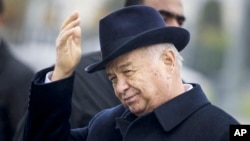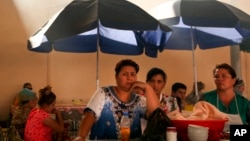The sudden hospitalization, due to an apparent stroke, of Uzbekistan’s only president since independence, Islam Karimov, has formed a dark cloud over the country as the most populous former Soviet republic in Central Asia on Wednesday and Thursday marks 25 years since breaking from the Soviet Union.
Instead of Karimov, who has not been seen in public for days, Prime Minister Shavkat Mirziyayev, a possible successor, is leading ceremonies, Russian media report. A concert the president usually attends for the occasion was cancelled.
Uzbek authorities rejected a report that Karimov is already dead. One of his daughters said Wednesday he remains in stable condition in a hospital.
Regardless, the mood of celebration is muted by the uncertainty over the president’s health and, more importantly, the lack of a clear successor.
“This is a huge test, one that has been anticipated for some time,” says Deirdre Tynan, who is based in Bishkek as the Central Asia project director for the International Crisis Group. “But if Uzbekistan stumbles, if the transition turns to political chaos, the risk of violent conflict is high; and in a region as fragile as Central Asia, the risk of that spreading is also high,” she wrote in e-mails to VOA's Moscow bureau.
Iron-fisted rule
Karimov has led Uzbekistan with an iron fist since 1989, just before the Soviet Union split apart. He has been heavily criticized for using law enforcement and the courts to repress political opponents, activists and the media as well as forcing millions to labor in cotton fields.
In 2005, security forces fired into a crowd of protesters in the eastern Uzbek city of Andijan. While Uzbek authorities put the death toll at 187, independent journalists and human rights groups say as many 1,000 people were killed.
According to New York-based Human Rights Watch, the Uzbek government has jailed thousands of people on politically motivated charges, many of whom have been subjected to torture.
Political analysts in Moscow say his heavy-handed approach has kept Islamic militants at bay and maintained stability. But they warn any power struggle among Uzbekistan’s ruling clans could see that threat exposed or exploited.
"Karimov for many years was a very serious defender of not only his country, but also the whole region from this radical Islamic threat,” said Alexander Golts, an independent defense analyst in Moscow and deputy editor of Yezhenedelny Zhurnal (Weekly Journal).
“And, unfortunately, everything was based on his personality, as is usual in all authoritarian regimes,” Golts said. "Karimov managed to establish security service[s] that can control everything in Uzbekistan.
“But God knows how these people from security will behave when Mr. Karimov disappears," Golts added.
Other regional analysts say most of Uzbekistan's elites want to avoid a nasty fight for Karimov’s throne.
“The beneficiaries in this struggle, the winners, may lose more in the course of struggle if they allow chaos and loss of control in the country during it,” Central Asia expert Arkady Dubnov said. “So there are limits beyond which the elites cannot afford a severe struggle using ‘unconventional’ methods of political struggle."
Kremlin watching
The Kremlin will be watching closely to see who comes next, Tynan said, as Uzbekistan’s stability and security is in Russia's interest. “Karimov was a highly unpopular figure among Russian diplomats,” she said.
“Moscow will want someone who is amenable, at least in public, to their policies," Tynan said. “In an ideal world, that’s someone who would have Uzbekistan re-join the CSTO (Collective Treaty Security Organization) and be open to the EEU (Eurasian Economic Union). In practical terms though, they would probably settle for someone who is not antagonistic and willing to at least go through the motions of mutual respect."
Regional expert Dubnov thinks Moscow may have a favorite contender to replace Karimov: Prime Minister Shavkat Mirziyayev. The prime minister is "supported by the head of the Internal Security Service, Rustam Innoyatov, who has been a KGB officer for a long time during the Soviet period and an unchangeable head of Uzbek security,” Dubnov said. “His idea of security that he got in the Soviet times can facilitate finding [a] common language in dialogue between Tashkent and Moscow.”
Russian officials have said little since Sunday, when Uzbekistan announced the president was hospitalized.
Kremlin spokesman Dmitry Peskov on Tuesday said they had no fresh information on Karimov and could not confirm reports about his death. Russia’s Interfax news agency reported Russian neurosurgeons are treating Karimov.
If Karimov dies, the head of Uzbekistan’s Senate becomes temporary leader for three months while new elections are arranged.





